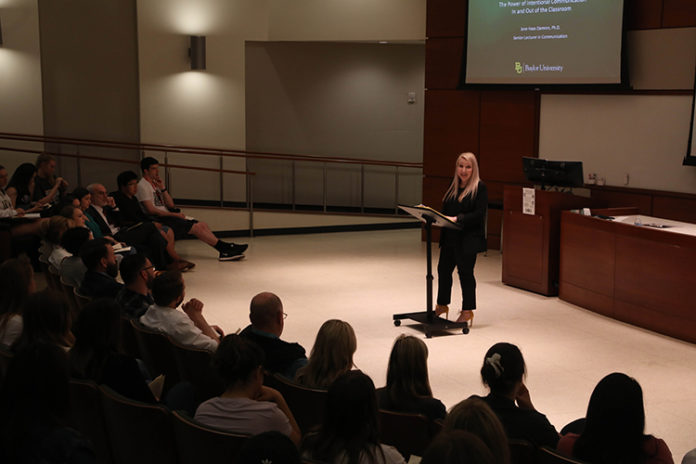
By Matthew Muir | Staff Writer
Senior lecturer Dr. Jane Damron said she felt honored to be included in the same company as some of Baylor’s great professors at the Collins Outstanding Professor Award Lecture Thursday afternoon.
The Collins Award recipient is selected each year by the senior class, with the recipient receiving recognition in university publications and at spring commencement and a $10,000 cash award. The award is provided by the Carr P. Collins Foundation. Damron, a senior lecturer who currently teaches classes in small group communication, nonverbal communication and interpersonal communication, is the 26th recipient of the award.
Damron accepted the award after senior class president Megan Galvin introduced her by saying Damron’s “enthusiasm for each subject unquestionably shines” through her teaching. Describing the 25 previous Collins Award winners as “pedagogical heavy hitters,” Damron said she felt honored and “overwhelmed in a good way” after receiving the award.
Houston junior Lizzy Humber, one of Damron’s current students. Humber said she enjoys having Damron as a professor, and being in Damron’s class when she won the award gave her a unique personal connection.
“It’s really awesome to see someone get an award that’s so deserved while you’re being taught by them,” Humber said.
In the midst of thanking family, friends, colleagues and mentors, Damron spoke about how the students she teaches affect her own life.
“[My students] make this work interesting, rewarding and exciting to me,” Damron said. “How they engage together is what fills my job with so much joy and freshness and growth.”
Caleb Damron, Jane Damron’s husband of 11 years, also attended the lecture. While Caleb said the Collins award “wasn’t even on [his] radar” until his wife was nominated, he added that she was well-deserving of the award.
“It’s amazing,” Caleb said. “It’s great to see her recognized for what she does so well.”
Each year the Collins Award recipient gives a lecture on a subject of their choice along with their acceptance of the award. Damron’s lecture, titled “The Power of Intentional Communication In and Out of the Classroom,” dealt with the importance of intentional communication, or the kind of communication one consciously tries to take part in.
According to Damron, intentional communication is key in a classroom setting. Damron said communicating effectively is the key to engaging and developing relationships with students, something she strives for while teaching.
“If I show that I care, they will be more likely to care,” Damron said. She said effective communication in the classroom is academically beneficial.
Damron highlighted the importance of intentional communication in relation to each of her three specific studies: interpersonal, nonverbal and supportive communication. Interpersonal communication is standard face-to-face communication between people. Nonverbal communication involves communicating through gestures, expressions or tone of voice. Supportive communication involves communicating with the goal of providing a sort of aid to another person. According to Damron, being familiar and skilled with all three of these forms of communication helps strengthen and improve a person’s relationships.





